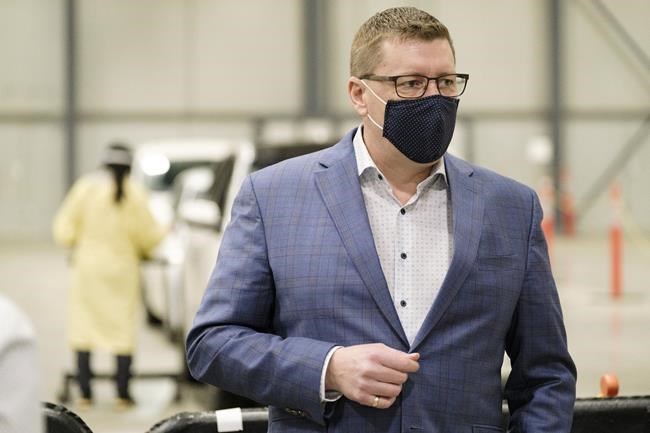REGINA — Saskatchewan is bringing in a proof of vaccination policy to try to increase the number of people immunized against COVID-19 and to decrease pressures on hospitals.
The policy is to come into effect Oct. 1, and will apply to nightclubs, bars, casinos, movie theatres, museums, indoor dining at restaurants and sporting events.
Proof of vaccination won't be required for civil services, retail or grocery stores, places of worship, at hotels or at non-ticketed amateur sporting events, including youth athletics and recreational leagues.
Those who are not vaccinated will have to show a negative test.
Premier Scott Moe says the policy is meant to make it increasingly difficult for those who haven't been immunized to move around communities.
"These are not measures we wanted to implement — and as a government we have been patient in providing the opportunity and access to get vaccinations — but that patience has come to an end," Moe said Thursday.
"The vast majority of Saskatchewan people have grown tired of the reckless decisions of the unvaccinated that are now driving our fourth wave."
Moe said all government employees will also be required to show proof of vaccination or a negative COVID-19 test.
Saskatchewan is also reinstating a provincewide mask mandate for all indoor public places starting Friday.
Moe had previously said he would not bring in vaccination passports and that getting a shot was a personal choice.
"As a province, and as a government, we have been very patient. Possibly too patient," he said.
Saskatchewan is the last province in Western Canada to implement such a policy.
Alberta Premier Jason Kenney, who had also been adamant that he would not require proof of vaccinations, announced Wednesday he was bringing in a similar program.
Unlike Kenney, Moe did not offer an apology. He said his Saskatchewan Party government acted in the best interests of its citizens with the information it had at the time.
Chief medical health officer, Dr. Saqib Shahab, said proof of vaccination may not be enough and further public health orders could be required.
Shahab has said in the past that vaccination rates need to increase by up to 15 per cent to see a reduction in hospitalizations.
Saskatchewan has the highest weekly rate of COVID-19 cases in Canada and the second-lowest rate of vaccinations among its eligible population, Health Canada data shows.
"Why in the worst pandemic we’ve seen in 100 years, (is) vaccine uptake so low?" Shahab said.
"Many other parts of the world are still waiting for the vaccines ... and here we have a third of the population mired in conspiracy theories."
Several unions representing health-care workers, as well as the official Opposition, were critical of Moe's response.
"Copying Jason Kenney’s ‘too-little, too-late’ plan is not leadership. And a premier who always acts last — if at all — is not a leader. The people of Saskatchewan deserve so much better than the arrogance and inaction of Scott Moe," NDP Leader Ryan Meili said in a statement.
The pandemic's fourth wave in Saskatchewan is putting significant capacity pressures on health care. Moe said that's why his government was reluctantly introducing the policy.
Last week, the province ran out of intensive care beds. The Saskatchewan Health Authority added another 51 spaces to accommodate a projection of 80 COVID-19 ICU patients and to maintain intensive care for 50 other non-COVID patients.
Health-care workers are being redirected to help deal with the surge, while doctors are deciding which surgeries need to be cancelled to free up beds. Hospitalizations are projected to climb in the next month before the new measures can show any effect.
"We will be tested as an organization like we have never been tested before in the upcoming weeks," said Scott Livingstone, CEO of the Saskatchewan Health Authority.
The province reported 439 new cases, 22 per cent of which were in children under the age of 12, who are ineligible for a vaccine. There were 218 people in hospital, 48 of them receiving intensive care.
Canada's chief public health officer, Dr. Theresa Tam, cautioned the rest of the country about what's happening in Saskatchewan and Alberta.
"Learn from the West, and know that this could happen anywhere where vaccine coverage is low," Tam said.
This report by The Canadian Press was first published Sept. 16, 2021.
Mickey Djuric, The Canadian Press


